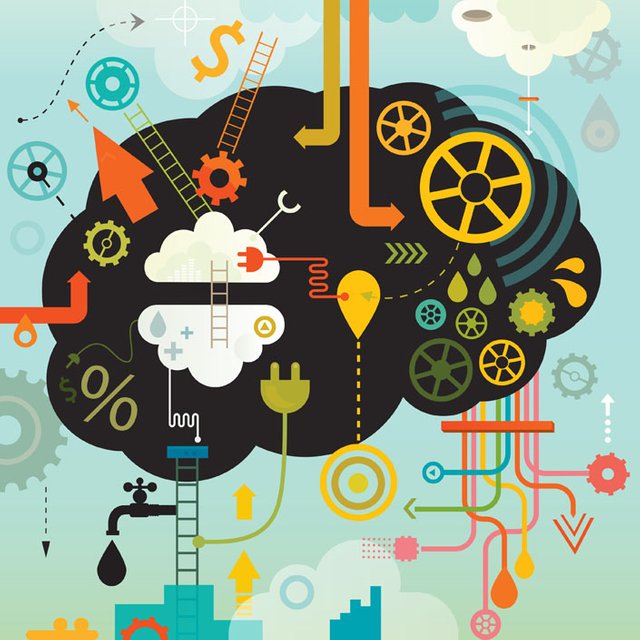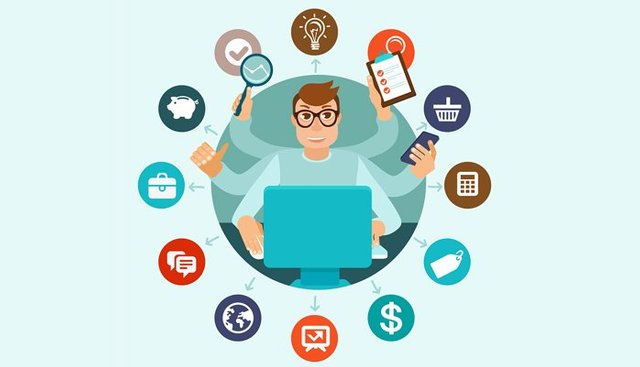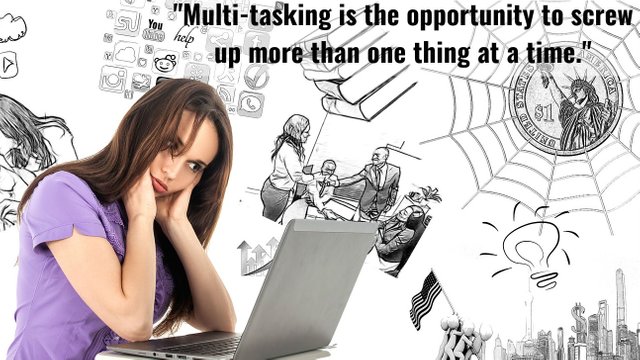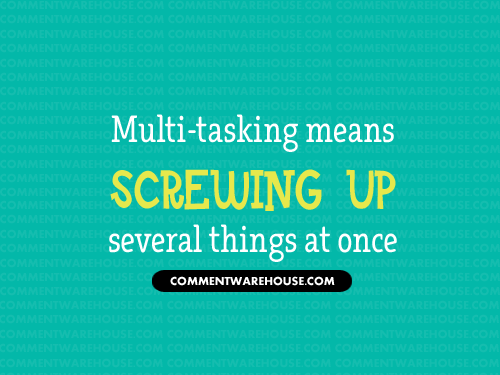Disadvantages of Multitasking To Brain Health and Productivity
Disadvantages of Multitasking To Brain Health and Productivity

Image Source
Multitasking appears like an incredible approach to complete a great deal on the double. While it may appear as though you are achieving numerous things on the double, look into has demonstrated that our brains are not great at dealing with different assignments as we jump at the chance to think we seem to be. Truth be told, a few analysts recommend that multitasking can really diminish productivity by as much as 40 percent!
It may appear as though you are completing numerous things in the meantime, however what you are truly doing is rapidly moving your consideration and center starting with one thing then onto the next. Changing starting with one undertaking then onto the next makes it hard to block out diversions and can bring about inabilities to think straight that can back you off.
Is All That Multitasking Really Making You More Productive?
Pause for a minute and consider everything you are doing well at this point. Clearly you are perusing this article, yet chances are great that you are likewise doing a few things without a moment's delay. Maybe you're likewise tuning in to music, messaging a companion, checking your email in another program tab, or playing a PC diversion.
In the event that you are doing a few unique things on the double, then you might be what analysts allude to as a "substantial multitasker." And you likely believe that you are genuinely great at this exercise in careful control. As indicated by various diverse reviews, notwithstanding, you are most likely not as compelling at multitasking as you think you seem to be.
Previously, many individuals trusted that multitasking was a decent approach to build productivity. All things considered, in case you're chipping away at a few unique assignments on the double, will undoubtedly finish all the more, isn't that so?
Late research, be that as it may, has exhibited that that changing starting with one errand then onto the next takes a genuine toll on productivity.
Multitaskers experience more difficulty blocking out diversions than individuals who concentrate on one assignment at any given moment. Additionally, doing as such various things without a moment's delay can really impede psychological capacity.

Image Source
What the Research on Multitasking Suggests
In the first place, how about we begin by characterizing what we mean when we utilize the term multitasking.
It can mean performing at least two undertakings all the while
It can likewise include exchanging forward and backward starting with one thing then onto the next
Multitasking can likewise include playing out various errands in quick progression.
Keeping in mind the end goal to decide the effect of multitasking, clinicians requested that review members switch assignments and after that deliberate how much time was lost by exchanging. In one review directed by Robert Rogers and Stephen Monsell, members were slower when they needed to switch assignments than when they rehashed a similar undertaking.
Another review led in 2001 by Joshua Rubinstein, Jeffrey Evans and David Meyer found that members lost noteworthy measures of time as they exchanged between numerous assignments and lost considerably additional time as the errands turned out to be progressively unpredictable.
Understanding What the Multitasking Research Means
In the mind, multitasking is overseen by what are known as mental official capacities.
These official capacities control and oversee other psychological procedures and decide how, when and in what arrange certain undertakings are performed.
As indicated by scientists Meyer, Evans and Rubinstein, there are two phases to the official control prepare.
The principal stage is known as "objective moving" (choosing to do one thing rather than another).
The second is known as "part actuation" (transforming from the principles for the past undertaking to rules for the new assignment).
Exchanging between these may just include a period cost of only a couple of tenths of a moment, however this can begin to include when individuals start exchanging forward and backward more than once.
This won't not be that enormous of an arrangement sometimes, for example, when you are collapsing clothing and sitting in front of the TV in the meantime. Be that as it may, in the event that you are in a circumstance where security or productivity are essential, for example, when you are driving an auto in overwhelming activity, even little measures of time can demonstrate basic.

Image Source
Commonsense Applications for Multitasking Research
Meyer recommends that productivity can be lessened by as much as 40 percent by the psychological barriers made when individuals switch undertakings. Since you comprehend the potential hindering effect of multitasking, you can give this information something to do to build your productivity and proficiency.
Is Multitasking Bad for Your Brain?
In today's bustling world, multitasking is very normal. Juggling numerous undertakings and obligations may appear like the most ideal approach to complete a great deal, yet as you have seen, attempting to accomplish more than one thing at any given moment can really lessen productivity and execution. Concentrate on one undertaking at any given moment, numerous specialists recommend, with a specific end goal to take care of business rapidly and effectively.
At any given minute you may be messaging a companion, exchanging between various windows on your PC, tuning in to the boom of the TV, and converse with a companion on the telephone - at the same time! When we do get a calm minute where nothing is requesting our consideration, we may get ourselves not able to evade the diversion of our most loved applications or web-based social networking locales.
So while we realize that this diversion and multitasking is bad for your productivity, is it conceivable that it may really be terrible for your mind wellbeing? What affect does such a consistent blast of incitement have on creating minds?
Multitasking surely isn't anything new, yet the consistent surges of data from various diverse sources represents a generally new measurement to the multitasking riddle.
Look into Multitasking Impacts the Brain
It turns out even individuals who are viewed as substantial multitaskers are not in reality great at multitasking.
In one 2009 review, Stanford University scientist Clifford Nass found that individuals who were viewed as substantial multitaskers were in reality more awful at sorting out significant data from insignificant points of interest. This is especially shocking in light of the fact that it was expected this is something that overwhelming multitaskers would really be better at. However, that wasn't the main issue these high multitaskers confronted. They additionally indicated more noteworthy trouble when it came to changing starting with one assignment then onto the next and were a great deal less rationally sorted out.
What was the most unnerving about the outcomes, Nass later recommended to NPR, was that these outcomes happened notwithstanding when these overwhelming multitaskers were not multitasking. The review uncovered that notwithstanding when these interminable multitaskers were concentrating on only a solitary assignment, their brains were less viable and effective.
"We considered individuals who were unending multitaskers, and notwithstanding when we didn't request that they do anything near the level of multitasking they were doing, their subjective procedures were debilitated. So fundamentally, they are more terrible at the vast majority of the sorts of intuition required for multitasking as well as what we by and large consider as including profound idea," Nass told NPR in a 2009 meeting.

Image Source
So is the harm from multitasking lasting, or will putting a conclusion to multitasking fix the harm. Nass recommended that while advance examinations are required, the present proof proposes that individuals who quit multitasking will have the capacity to perform better.
Specialists additionally recommend that the negative effect of constant, substantial multitasking may be the most inconvenient to juvenile personalities. At this age specifically, high schooler brains are occupied with shaping critical neural associations.
Spreading consideration so thin and continually being diverted by various floods of data may have a genuine, long haul, negative effect on how these associations frame. While this is a zone that still requires significant research, specialists trust that high schoolers - the individuals who frequently participate in media multitasking the most intensely - might be especially powerless against any negative results of multitasking.
Limiting the Negative Consequences of Multitasking
So what would it be a good idea for you to do to maintain a strategic distance from the conceivable harmful effect of multitasking?
According to Nass, restricting the measure of things you juggle at any offered time to only two-assignments.
Alternatively, he prescribed what he alluded to as the "20-minute run the show." Instead of always exchanging forward and backward starting with one assignment then onto the next, attempt to completely give your regard for one errand for a 20-minute time span before changing to the following undertaking. Along these lines, rather than exchanging forward and backward between composing a report for school and doing your math homework, burn through 20-minutes on the one task before changing to concentrate you consideration on the following.
Be that as it may, Multitasking Isn't Always a Bad Thing
As per a review by scientists from The Chinese University of Hong Kong, multitasking may not generally be all awful. Their work proposes that individuals who take part in media multitasking, otherwise known as utilizing more than one type of media or sort of innovation on the double, may be better at incorporating visual and sound-related data.
In the review distributed in Psychonomic Bulletin and Review, members between the ages of 19 and 28 years old were made a request to finish polls in regards to their media use. The members then finished a visual inquiry errand both with and without and sound-related sound to demonstrate when the thing changed shading.
The individuals who were media multitaskers performed better on the visual inquiry when the sound-related tone was exhibited, showing that they were more skilled at incorporating the two wellsprings of tangible data. Then again, these substantial multitaskers performed more terrible than the light/medium multitaskers when the tone was absent.
There has been a lot of research to date on the negative effects of multitasking. Individuals who switch between assignments have a tendency to lose time and have issues keeping focused, which negatively affects both productivity and execution. While multitasking still has its drawbacks, this examination may demonstrate that our steady introduction to numerous types of media may have a few advantages.

Image Source
Source:
Journal of Experimental Psychology: Human Perception and Performance
I guess 'multi-tasking' is kind of an oxymoron, since it's largely a mythical skill. I'm reminded of some things my mother used to say such as 'haste makes waste' and 'lazy man's load'. The more we try to cut corners and save time, the more time we end up wasting in the long run due to errors and oversights. Thanks for an excellent post.
Yeah right it will lessen the focus which will result to less productivity.
Interesting Thank you for noting on both points, it seems logical, if you multitask, you should be able to switch between topics freely, thus your "barrier for entry" for your attention is lowered, thus you are "unfocused"
On the other hand, you are viewing more information streams unconsciously from time to time, it's a interesting topic. The brain is a big machine :) Time to play my games :D
Yeah so much for the human brain that even years of studies are not enough.
Thank God there are perks to multitasking as with each day, it gets harder not to! In the case of stressful situations, multitasking may just even save you.
Theres nothing wrong with multi tasking as long as a person can handle it. But there are studies which prove that its productivity is inferior compared to focus task.
Anything built solid was a display of true focus... cryptocurrencies and blockchain as example, can you imagine them writing code without total focus.
Exactly, you had it right
@juvyjabian
Very good information. I know that what you put before us to study and think about is true. I know that, because of what I do almost daily. Multitasking may be OK on things that don't matter. But, for important activity and thought in our lives. You are right. In multitasking, something is going to suffer some percentage loss.
Thank you
Francis
Thanks. Glad you like it
If your tasks can be done with Pareto's 20/80 rule:- where you do few to achieve more then i feel multitasking can be effective.
Maybe smaller task would do